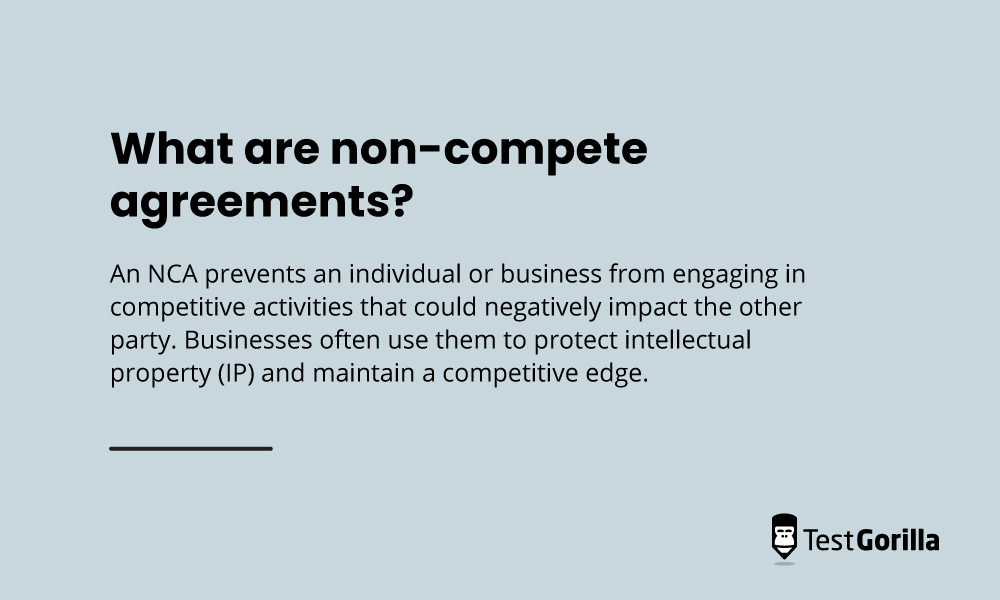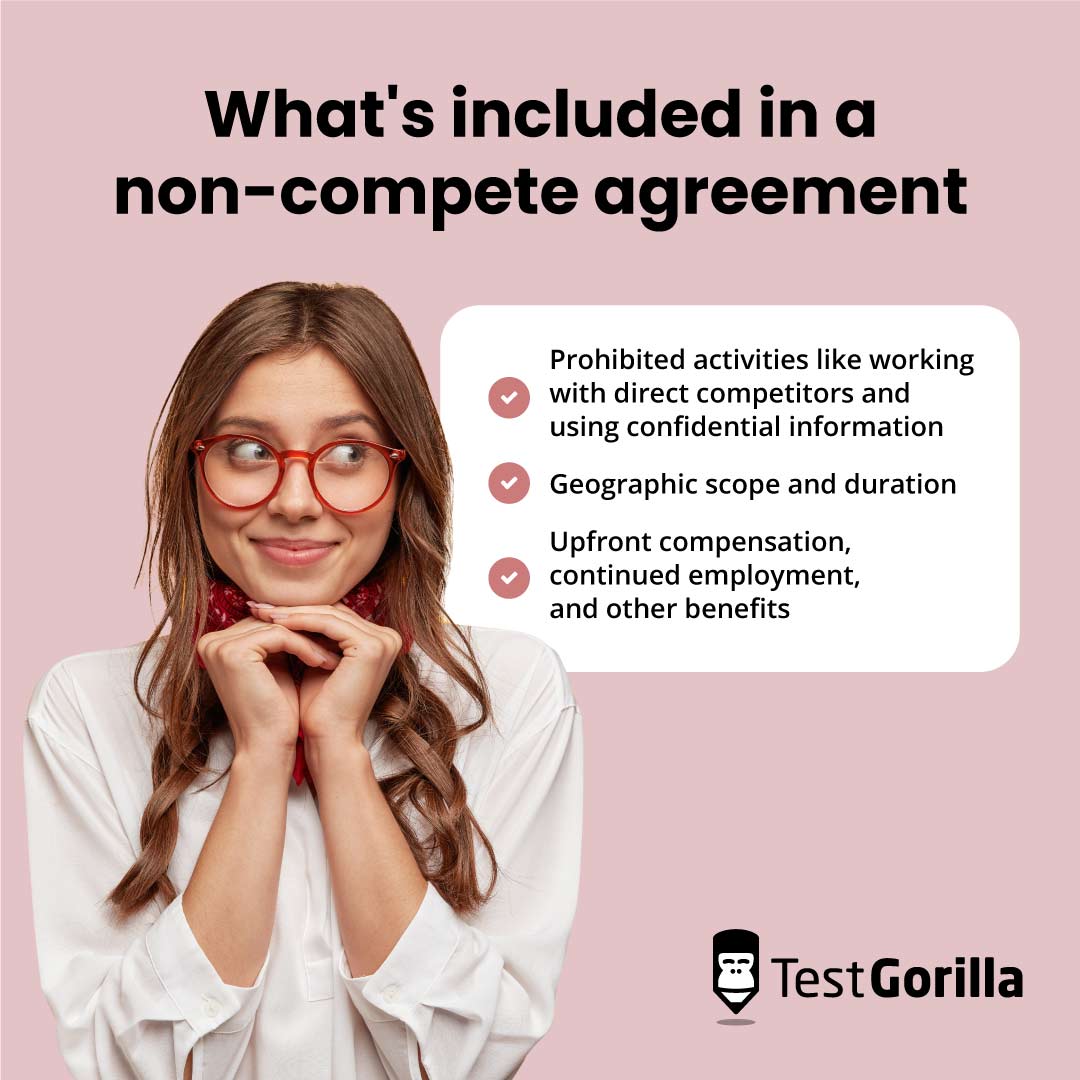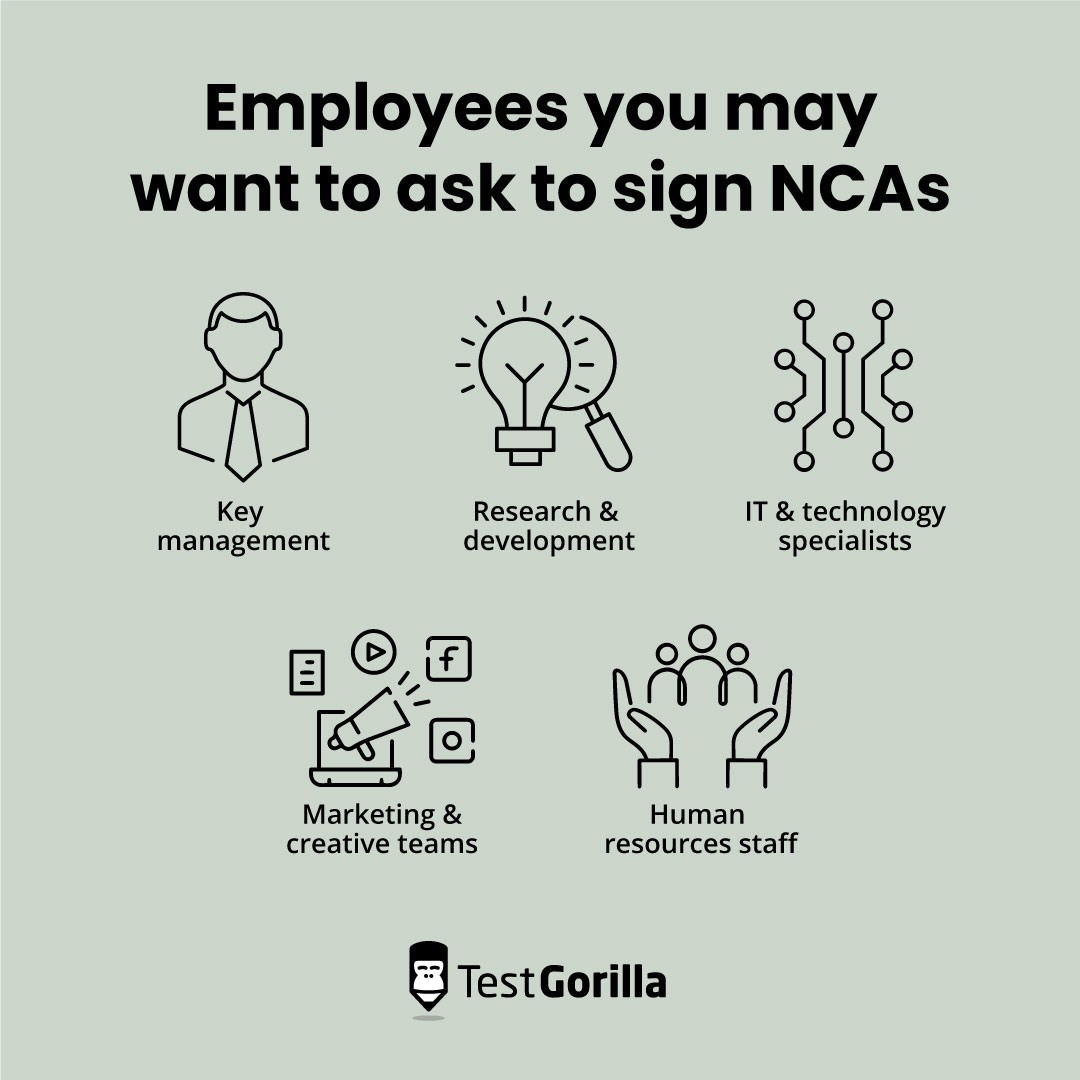Many business owners wonder whether they should ask employees to sign non-compete agreements (NCAs). In the right circumstances, an NCA is a valuable tool to protect business interests and preserve a competitive edge in the hiring market. However, keeping up with ever-evolving state laws that limit – or even prohibit – these agreements can be a struggle. And failing to follow local guidelines can leave you with an agreement that can’t be enforced.
Sound overwhelming? We’re here to help. In this article, we cover the purpose of NCAs and how you can use them to your benefit. We also look at the legal challenges you may face and discuss where you can find help to ensure your business agreements serve the right purpose.
Table of contents
- Understanding non-compete agreements – what are they?
- What's included in a non-compete agreement
- Why use non-compete agreements
- When to use non-compete agreements
- Difference between non-compete and non-solicitation agreements
- Legalities of non-compete agreements
- Working with an attorney or legal advisor on non-compete agreements
- How TestGorilla can help you hire the best candidates
Understanding non-compete agreements – what are they?
An NCA prevents an individual or business from engaging in competitive activities that could negatively impact the other party. Businesses often use them to protect intellectual property (IP) and maintain a competitive edge.
For example, imagine a tech company is building a new form of business software. They want to hire Jessica, a software developer, to work on the new software project. To do her job, Jessica must access proprietary source code and algorithms that the company has worked hard to develop.
The company asks Jessica to sign an NCA in her employment contract that limits her ability to join a direct competitor business or share trade secrets. This prevents Jessica from being able to use the company’s IP to benefit its competitors.
What's included in a non-compete agreement
Let’s take a look at the information that’s normally included in an NCA between an employer and employee. This information falls into three distinct categories: activities prohibited by the agreement, the scope and duration of the agreement, and compensation paid in exchange for the agreement. Each of these categories needs to be “reasonable.” This means the agreement provides protection without unnecessarily or unfairly restricting the employee from pursuing future career opportunities or earning a livelihood in their chosen industry.
Prohibited activities
An NCA needs to clearly lay out what the employee can’t do. This ensures the employee understands what they must avoid. Clarity on what the contract prohibits is also vital to creating an NCA that’s legally viable.
Prohibited activities often include:
Working with direct competitors. A common expectation of NCAs is that the signing employee won’t compete against the employer. This could include working for a rival of the employer’s business or starting a competing company.
Using confidential information. NCAs often prevent an employee from using trade secrets and other confidential information that they learned through their work.
Scope and duration
NCAs must specify where the agreement applies and how long it will last. Clarifying the geographic scope and duration is necessary to ensure the agreement is reasonable and legally enforceable. Limits on where and how long an NCA is active can vary. Let’s take a closer look at these factors:
Geographic scope. This is often defined as a city, a region, or sometimes a specific distance from the employer’s business. For example, a sales executive could be limited from engaging in sales for a competitor within the same city.
Duration. It’s common for NCAs to last from six months to two years. Longer time periods are appropriate only when very specialized IP is at stake or the employer paid for significant training for the employee. The duration should always be limited to no longer than what’s necessary to protect the employer’s interest.
Consideration
Consideration simply refers to the compensation paid to an employee in exchange for them signing the NCA. Consideration may take the form of a cash payment – but it doesn’t always require additional payment. Common forms of consideration include:
Upfront compensation. Some employers choose to offer a payment or signing bonus in exchange for the employee’s agreement. This provides immediate financial compensation for limiting their future opportunities.
Other benefits. Employer offerings, like access to specialized training or benefits programs, can also be used as a form of consideration.
Continued employment. In some circumstances, the fact that the employer allows the employee to continue working is sufficient consideration for the NCA. Whether this is reasonable depends on how much opportunity the employee is giving up. When the value of continuing employment isn’t equal to what the employee will lose, enforcing the agreement may be difficult.
The best insights on HR and recruitment, delivered to your inbox.
Biweekly updates. No spam. Unsubscribe any time.
Why use non-compete agreements
NCAs aren’t just about limiting the actions of employees. They also provide a layer of protection for companies and can help build a competitive edge.
Protection of business interests
NCAs are primarily used to protect a company's vital business interests. They serve as a legal shield to safeguard the following assets and proprietary information:
Trade secrets. Companies often invest heavily in developing unique processes, technologies, and proprietary knowledge. NCAs prevent employees and contractors from taking these valuable trade secrets to competitors. As a result, the NCA preserves the company's IP.
Confidential information. Businesses regularly share confidential information with their employees. For example, a finance manager needs access to their company’s financial data. A company executive needs access to the company’s strategic plans. NCAs ensure this sensitive information remains confidential and that employees don’t use it to compete against the company.
Maintaining a competitive edge
In today's competitive business environment, maintaining a competitive edge is crucial. NCAs play a pivotal role in this regard:
Key employees. Non-competes encourage employees with specialized skills, unique industry knowledge, or strategic insights to remain with the company. This makes it more difficult for competitors to poach your key talent.
Preserving market share. By preventing former employees from immediately joining competitors and using their inside knowledge at the expense of their former employer, NCAs help protect the company's market share. This helps build financial stability.
Innovation. In industries where innovation and product development are critical, NCAs can prevent cutting-edge knowledge and technological advancements from spreading to rivals. By holding an edge in innovation, your business is better equipped to maintain its leadership position.
While you should use them wisely, non-competes can be instrumental in preserving your company's competitive position and long-term growth.
When to use non-compete agreements
Determining when to use NCAs is crucial to protecting your business interests. While these contracts can be powerful tools, they’re not always necessary. And since some people will turn down jobs if they believe NCAs will overly restrict their future career options, these agreements can also limit your talent pool. This is why you should use them only when necessary.
Employers often ask employees who have highly strategic roles and/or access to sensitive and proprietary information to sign NCAs. Asking lower-level employees – who don’t have this type of access or business impact – to sign these can be a wasted effort. They’re also less likely to be legally enforceable.
Here are some examples of employees that you might want to ask to sign NCAs:
Key management: Executives, managers, and other high-level employees who have access to strategic plans, confidential information, or trade secrets
Research and development: Employees involved in product development, research, or innovation who have access to proprietary technology and IP
IT and technology specialists: Employees possessing technical know-how who work with proprietary software, source code, or algorithms
Marketing and creative teams: Employees responsible for branding, marketing strategies, or content creation
HR staff. HR personnel with access to confidential information, including employee data
Difference between non-compete and non-solicitation agreements
Non-compete and non-solicitation agreements are both legal tools used by employers to protect their interests. However, they address different aspects of employee conduct.
While NCAs restrict employees or former employees from competing with the employer, a non-solicitation agreement focuses on preserving relationships with the company's clients, customers, and employees. It typically prohibits employees from asking these individuals to leave your business to join a competitor.
Legalities of non-compete agreements
Varying laws across the US limit NCAs. In fact, four states (California, Minnesota, North Dakota, and Oklahoma) and the District of Columbia have banned their use entirely. The Society for Human Resource Management (SHRM) has tracked a growing trend against NCAs in the US.
This is because NCAs can stifle individual career growth, limit healthy competition, and hinder innovation. Governments that have adopted laws to restrict NCAs hope to avoid their potential limits on economic progress and societal well-being.
It’s important to understand how your state views NCAs before relying on them to protect your business.
Several states (Colorado, Illinois, Maine, Maryland, New Hampshire, Oregon, Rhode Island, Virginia, and Washington) only allow NCAs for employees earning over a set salary. Others (Iowa and Kentucky) don’t allow NCAs in industries like healthcare where limiting competition isn’t aligned with the public interest. Competition is beneficial to such industries because it promotes innovation, ensures a broader range of services and choices for consumers, and can lead to more affordable pricing.
Working with an attorney or legal advisor on non-compete agreements
When you choose to use NCAs, an attorney or advisor with specialized employment law knowledge can provide valuable insights regarding which roles in your organization are suitable for NCAs. They also stay updated on the latest state laws and legal standards, ensuring your agreements can pivot as needed.
A corporate law advisor can also be helpful. With their broad business understanding, they can help structure NCAs in a way that aligns with your company's broader objectives. Additionally, they can ensure that NCAs don't conflict with other business agreements.
Hiring an attorney or legal advisor for your business can be a challenge because you want them to be familiar with several areas of law. Testing for legal knowledge in the areas you need will ensure your candidates are up to speed on NCAs and other aspects of common business contracts.
TestGorilla’s assessments can help. For instance, our US Contract Law test will help you evaluate your candidates’ knowledge of contract law fairly and accurately. Our other law-based tests cover IP law and corporate law, among other topics.
Combining role-specific tests like these with soft skills assessments, like our negotiation and critical thinking tests, will give you a full understanding of each candidate. This will help you hire the one who’s best suited for the role.
How TestGorilla can help you hire the best candidates
NCAs are valuable tools that can protect your business assets and preserve your competitive edge. It’s necessary to fully understand when and how to use these agreements to ensure they serve their intended purpose.
The legalities of NCAs vary. Working with someone who’s up to speed on the relevant laws can be extremely helpful – making the difference between an agreement that’s enforceable and one that won’t stand up to a legal challenge.
TestGorilla can help you find the best legal advisors, including attorneys. In fact, TestGorilla’s range of 300+ pre-employment tests can help you find the best candidates for any position – whether you use NCAs for those positions or not.
Start a free trial of TestGorilla today to learn more about how we can help you find the best-suited people for your organization.
You've scrolled this far
Why not try TestGorilla for free, and see what happens when you put skills first.





















